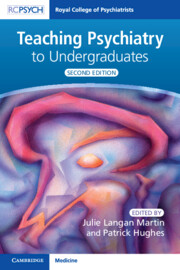Book contents
- Teaching Psychiatry to Undergraduates
- Teaching Psychiatry to Undergraduates
- Copyright page
- Contents
- Contributors
- Section 1 Principles of Medical Education
- Section 2 The Undergraduate Psychiatry Curriculum: Planning and Delivery
- Chapter 2.1 Understanding Curriculum Design
- Chapter 2.2 Preclinical Versus Clinical Years
- Chapter 2.3 Patients as Educators in Psychiatry: The Ethical and Educational Case
- Chapter 2.4 Assessment of Undergraduates in Psychiatry
- Chapter 2.5 Beyond the Undergraduate Core Curriculum
- Chapter 2.6 Supporting the Psychiatrists of Tomorrow
- Section 3 Clinical Placements in Psychiatry
- Section 4 Formal Teaching
- Section 5 Materials Development
- Section 6 Gathering feedback and quality improvement
- Section 7 Student Welfare
- Section 8 Developing as a medical educator
- Index
- References
Chapter 2.1 - Understanding Curriculum Design
from Section 2 - The Undergraduate Psychiatry Curriculum: Planning and Delivery
Published online by Cambridge University Press: 12 October 2022
- Teaching Psychiatry to Undergraduates
- Teaching Psychiatry to Undergraduates
- Copyright page
- Contents
- Contributors
- Section 1 Principles of Medical Education
- Section 2 The Undergraduate Psychiatry Curriculum: Planning and Delivery
- Chapter 2.1 Understanding Curriculum Design
- Chapter 2.2 Preclinical Versus Clinical Years
- Chapter 2.3 Patients as Educators in Psychiatry: The Ethical and Educational Case
- Chapter 2.4 Assessment of Undergraduates in Psychiatry
- Chapter 2.5 Beyond the Undergraduate Core Curriculum
- Chapter 2.6 Supporting the Psychiatrists of Tomorrow
- Section 3 Clinical Placements in Psychiatry
- Section 4 Formal Teaching
- Section 5 Materials Development
- Section 6 Gathering feedback and quality improvement
- Section 7 Student Welfare
- Section 8 Developing as a medical educator
- Index
- References
Summary
Curriculum development is an essential, challenging but rewarding aspect of undergraduate medical education. It requires a knowledge of underlying education theory and principles, collaboration from various interested parties, administrative support, energy, drive, and commitment. Recognising how psychiatry fits into an overall educational system helps to highlight its importance as a core aspect of medical school learning. Taking time to plan effective learning, be it for a whole course or a single session, is a rewarding experience – your students and their future patients will thank you for it.
- Type
- Chapter
- Information
- Teaching Psychiatry to Undergraduates , pp. 17 - 29Publisher: Cambridge University PressPrint publication year: 2022



